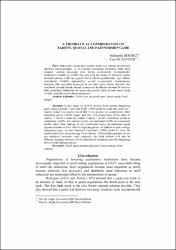| dc.contributor.author | Bekmez, Selahattin | |
| dc.contributor.author | Baydur, Cem Mehmet | |
| dc.date.accessioned | 2020-11-20T17:35:34Z | |
| dc.date.available | 2020-11-20T17:35:34Z | |
| dc.date.issued | 2006 | |
| dc.identifier.issn | 1300-4646 | |
| dc.identifier.issn | 2147-7582 | |
| dc.identifier.uri | https://app.trdizin.gov.tr//makale/TmpJM01qQXc | |
| dc.identifier.uri | https://hdl.handle.net/20.500.12809/8197 | |
| dc.description.abstract | Makalemiz uluslar arası ticarete konu olan koruma duvarlarının etkilerini karşılaştırmakta ve bu koruma araçlarının hangisinin daha etkin sonuçlar verecegi konusunu oyun teorisi çerçevesinde incelemektedir. Modelimiz Copland vd. (1989) den yola çıkıp bu modeli iki ülkeli bir model olmaktan çıkarıp, n ülke için geçerli olacak şekilde genişletmiştir. Eger ülkeler stratejilerini “ortaklık (partnership) oyunu” çerçevesinde oluştururlarsa, ticaretten elde edecekleri kazanclar da onu göre daha yüksek olacaktır. Saf stratjilerin yanında karışık strateji oyunlarının da dikkate alınması bu kazancı daha artıracaktır. Makalemiz bu çerçevede pazarlık gücü oyununu analiz etmiş ve ilgili stratejileri teorik olarak tartışmıştır. | en_US |
| dc.description.abstract | In this paper we tried to analyze three country bargaining game, using Copland, Tower and Webb (1989) model in which they used two -country model. Our results proved that if two country act cooperatively, their bargaining power will be bigger, and they will extract some of the gains of country 1, which is relatively smaller. Country 1 prefers constrained quotas to constrained tarifffs. All countries prefer unconstrained tarifffs to constrained tarifffs while their ranking of the constrained versus unconstrained quota regimes depends on their relative bargaining power. In addition to pure strategy bargaining game, we also barrowed Copeland& #8217; s (1989) model to show the implications of the mixed strategy Nash solution. If both trading partners do not use traditional protection tools separately, the Nash solution will also be different. Strategic solutions will be determined depending upon the bargaining powers of the trading partners. | en_US |
| dc.item-language.iso | eng | en_US |
| dc.item-rights | info:eu-repo/semantics/openAccess | en_US |
| dc.subject | İktisat | en_US |
| dc.subject | İşletme | en_US |
| dc.title | A Theoratical Consideration on Tariffs, Quotas and Partnership Game | en_US |
| dc.item-type | article | en_US |
| dc.contributor.department | MÜ, İktisadi ve İdari Bilimler Fakültesi, İktisat Bölümü | en_US |
| dc.contributor.institutionauthor | Bekmez, Selahattin | |
| dc.contributor.institutionauthor | Baydur, Cem Mehmet | |
| dc.identifier.volume | 20 | en_US |
| dc.identifier.issue | 2 | en_US |
| dc.identifier.startpage | 139 | en_US |
| dc.identifier.endpage | 148 | en_US |
| dc.relation.journal | Atatürk Üniversitesi İktisadi ve İdari Bilimler Dergisi | en_US |
| dc.relation.publicationcategory | Makale - Ulusal Hakemli Dergi - Kurum Öğretim Eleman | en_US |


















